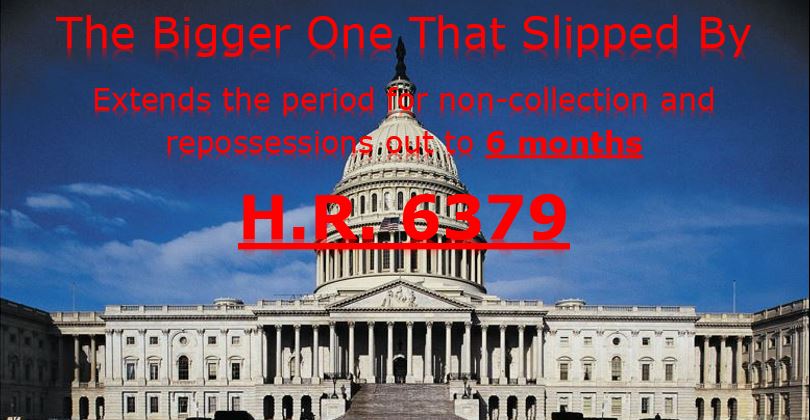
While we were all distracted by S. 3565 introduced into the senate on March 22nd, Congress had been working on an even more draconian and sweeping bill that could cripple the collections and lending world for years to come. H.R. 6379, the “Take Responsibility for Workers and Families Act” which was introduced on March 23rd an is cosponsored by Financial Services Committee Chairwoman, CA Rep. Maxine Waters, is similar in repossession and collections prohibitions with greater detail than the senate bill, but this bill proposes to extend the period for non-collection and repossessions out to 6 months after the declared end of the pandemic crisis.
While S. 3565 languishes in the senate, this bill has broader support and has been introduced to three Democratic controlled House committees and co-sponsorship by nine Democratic Congress members.
Recent remarks from former CFPB Director Ricard Cordray and state level actions taken in Massachusetts and the District of Columbia illuminate a growing pattern of sentiment in support of such lengthy and heavy handed restrictions. Buried deep in this pork laden bill, which authorizes hundreds of millions of dollars for a plethora of areas, ranging from bilingual election requirements to student aid, as well as many items already covered in the last round of stimulus spending.
H.R. 6379 contains the following provisions that are even more severe than the Senate Bill, S. 3565, introduced by Rep. Sherrod of Ohio (D). Title one of H.R. 6379, entitled “PROTECTING CONSUMERS, RENTERS, HOMEOWNERS AND PEOPLE EXPERIENCING HOMELESSNESS”, which also includes a six month post pandemic moratorium on rents, are the following suspension and prohibition items;
SEC. 103. Suspension of other consumer loan payments.
(a) In general.—During the COVID–19 emergency, a debt collector may not, with respect to a debt of a consumer (other than debt related to a federally related mortgage loan)—
(1) capitalize unpaid interest;
(2) apply a higher interest rate triggered by the nonpayment of a debt to the debt balance;
(3) charge a fee triggered by the nonpayment of a debt;
(4) sue or threaten to sue for nonpayment of a debt;
(5) continue litigation to collect a debt that was initiated before the date of enactment of this section;
(6) submit or cause to be submitted a confession of judgment to any court;
(7) enforce a security interest through repossession, limitation of use, or foreclosure;
(8) take or threaten to take any action to enforce collection, or any adverse action for nonpayment of a debt, or for nonappearance at any hearing relating to a debt;
(9) commence or continue any action to cause or to seek to cause the collection of a debt, including pursuant to a court order issued before the end of the 120-day period following the end of the COVID–19 emergency, from wages, Federal benefits, or other amounts due to a consumer by way of garnishment, deduction, offset, or other seizure;
(10) cause or seek to cause the collection of a debt, including pursuant to a court order issued before the end of the 120-day period following the end of the COVID–19 emergency, by levying on funds from a bank account or seizing any other assets of a consumer;
(11) commence or continue an action to evict a consumer from real or personal property; or
In addition to these prohibitions, telephonic communications with borrowers would be prohibited except with prior consent and written communications would be limited to informational purchases with no allowance to express the desire to collect a debt. Please note that much of the language in this is similar to recent state level actions taken in Massachusetts and the District of Colombia and if unable to push this through the senate or the white house, a state by state implementation of similar acts may go into play along very probable partisan party lines.
(d) Communications in connection with the collection of a debt.—
(1) IN GENERAL.—During the COVID–19 emergency, without prior consent of a consumer given directly to a debt collector during the COVID–19 emergency, or the express permission of a court of competent jurisdiction, a debt collector may only communicate in writing in connection with the collection of any debt (other than debt related to a federally related mortgage loan).
Buried in section 108, Mortgage Forbearance, is section (2), which states:
(2) REPOSSESSION PROHIBITION.—During the COVID–19 emergency and for the 180-day period following such emergency, a servicer of a consumer loan secured by a manufactured home or a motor vehicle may not repossess such home or vehicle.
(b) Prohibition on foreclosures and repossessions during the COVID–19 emergency.—
(1) PROHIBITION ON FORECLOSURES.—The Real Estate Settlement Procedures Act of 1974 (12 U.S.C. 2601 et seq.) is amended—
(A) in section 3 (12 U.S.C. 2602)—
(i) in paragraph (8), by striking “and” at the end;
(ii) in paragraph (9), by striking the period at the end and inserting “; and”; and
(iii) by adding at the end the following:
“(10) the term ‘COVID–19 emergency’ means the period that begins upon the date of the enactment of this Act and ends on the date of the termination by the Federal Emergency Management Agency of the emergency declared on March 13, 2020, by the President under the Robert T. Stafford Disaster Relief and Emergency Assistance Act (42 U.S.C. 4121 et seq.) relating to the Coronavirus Disease 2019 (COVID–19) pandemic.”; and
(B) in section 6(k)(1) (12 U.S.C. 2605(k)(1))—
(i) in subparagraph (D), by striking “or” at the end;
(ii) by redesignating subparagraph (E) as subparagraph (G); and
(iii) by inserting after subparagraph (D) the following:
“(E) commence or continue any judicial foreclosure action or non-judicial foreclosure process or any action to evict a consumer following a foreclosure during the COVID–19 emergency or the 180-day period following such emergency (except that such prohibition shall not apply to a mortgage secured by a dwelling that the servicer has determined after exercising reasonable diligence is vacant or abandoned);
“(F) fail to toll the time in a foreclosure process on a property during the COVID–19 emergency or the 180-day period following such emergency (except that such prohibition shall not apply to a mortgage secured by a dwelling that the servicer has determined after exercising reasonable diligence is vacant or abandoned); or”.
As earlier mentioned, many provisions of the larger bill were already covered under the last round of stimulus spending, but the collections and repossessions items did not. Obviously, an act as broad and sweeping as this applied over the entire length of the FEMA declaration period and the period of the war powers act plus an additional six months, would make this go on for perhaps as long as two years and would destroy the collections and repossessions industries as well as cripple the entire banking, lending and credit world as we know it.
While the pandemic tide in the US appears to be flatlining and talk of resumption of business is beginning, additional congressional action will doubtlessly be required. As evidenced in the last round of spending, the partisanship is at a fever pitch and the Democratic party seems very intent on pushing through as much of their agenda as possible in exchange for giving the White House victories at any level and have shown a desire to continue the nationwide lockdown for an even more extended period of time.
How far this will go is questionable as the lobbying powers of the American Banker Association, Auto Finance Industry and the NAFCU and CUNA will likely press hard against it as we urge you all to do individually through your local state representatives.










